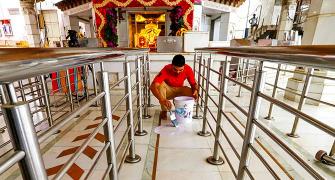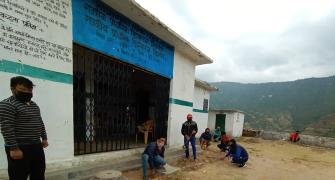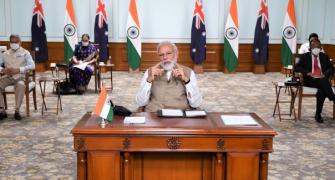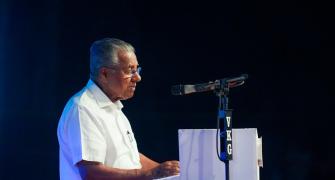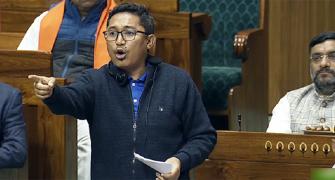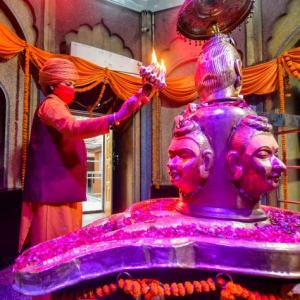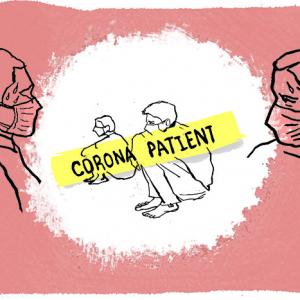As the country made a calibrated exit from the lockdown in non-containment zones, shop shutters in many malls went up for the first time since March 25 but the sprawling retail places were eerily empty.

India on Monday took a tentative step out of a 75-day lockdown with malls, religious places and offices opening in several parts of the country but with strict riders limiting the number of people and mandating sanitisation of the premises.
Heralding a new era of shopping, working and worshipping in a society battling rising COVID-19 cases, the extensive dos and don'ts framework included sanitisation tunnels, temperature checks, entry on the basis of tokens, no ‘prasad' and no trying out clothes either.
As the number of cases crossed 2,56,000 with more than 7,100 fatalities, according to Union health ministry figures, and the country made a calibrated exit from the lockdown in non-containment zones, shop shutters in many malls went up for the first time since March 25 but the sprawling retail places were eerily empty.
In Delhi's Select City Mall, for instance, as shop assistant arranged shelves and placed mannequins outside, signs of “We missed you, Welcome Back' were put up in greeting.
But only a few braved the coronavirus scare to venture into the mall, now all about functionality and not leisure.

Some restaurants opened but waiters were in face shields and the customers, at tables placed a safe distance from each other, in masks.
The stay away zones were marked with big crosses.
The buzzword was ‘contactless', not just in shops and restaurants, where digital menus replaced hard copies in some places, but also in places of worship.
The Union culture ministry has also approved the opening of 820 centrally-protected monuments under the Archaeological Survey of India.

Gurdwaras, temples, mosques and churches opened their doors in several parts of the country, including in Delhi, West Bengal and Karnataka, but the entry of devotees was restricted in keeping with social distancing norms.
In some places, temple bells were wrapped in cloth.
The government last week issued a set of standard operating procedures outside containment zones, mandating strict adherence to contain the spread of COVID-19.

The SOPs were advisory in nature and the state governments were left to finetune the details.
So, while Maharashtra and Tamil Nadu, for instance, decided to keep malls and places of worship closed, some states decided to relax restrictions and welcome people back in.
The Chhattarpur temple complex in Delhi, the Lord Venkateswara temple in Hyderabad, the Mahavir Mandir in Patna, the Sri Rama temple in Bhadrachalam and the Mookambika temple in Udupi were among the several temples that opened their doors.
Besides, the Jama Masjid in Delhi and the Golden Temple in Amritsar also welcomed devotees after the long gap.

In every place, masks, sanitising, social distancing and carefully regulated entries were the norm.
The Ram Janmabhoomi temple in Ayodhya opened with precautions in place to prevent the coronavirus spread.

According to Acharya Satyendra Das, chief priest of the temple, only five people were allowed to pay obeisance at a time and that too 15 metres away from the idol of Ram Lalla.
“No prasad will be allowed as earlier and devotees will have to follow the coronavirus protocol,” he said.

The Chhatarpur temple complex in Delhi, for instance, opened around 8.45 am with nearly 300 devotees visiting in the first hour.
"We have set up a sanitisation tunnel at the temple entrance and are using a thermal gun to screen people. No prasad and flowers are allowed," Kishor Chawla, CEO of the Chhatarpur temple management committee, said.
The historic Jama Masjid in the Walled City did not open for the first namaz at 5 am but welcomed worshippers later in the day.

"Social distancing and sanitisation measures have been put in place to prevent the spread of the virus during congregational prayers," said the Shahi Imam, Syed Ahmed Bukhari.
Gurdwaras opened, too, but it was far from normal.
Though there were some devotees, the usual buzz around the ‘sarovar' pond, at the Bangla Sahib gurdwara was missing and the place was deserted.
Social distancing is being enforced by ensuring that people do not stay longer inside the sanctum sanctorum of the shrines, said Delhi Sikh Gurudwara Management Committee (DSGMC) chairman Manjinder Singh Sirsa.

In Karnataka, too, places of worship, hotels and restaurants opened for public in Bengaluru but within the norms specified by the Centre.
The temples reopened for 'darshan' of devotees, but special pujas will not be performed, official sources said.
There were other restrictions as well.
The Mookambika temple in Udupi district, for instance, restricted the entry of people over 60 and under 10 for the next 15 days, the management said.

All the devotees were required to wear masks and stick to social distancing norms.
Several mosque managements said they are not providing namaz mats and water for ablution at the premises. Some also requested devotees to offer prayers at their homes.
The Archdiocese of Bangalore has already deferred the opening of churches till June 13.
Though hotels and restaurants opened for dining, the number of customers remained scarce.

In Tamil Nadu, where shops had opened some time ago, restaurants were closed for dine-in customers but takeaways continued.
In West Bengal, shopping malls, restaurants and other establishments reopened to a cautious welcome too.
The Mamata Banerjee-led government, which has extended the lockdown till June 30, had eased curbs in the state from June 1, allowing places of worship to reopen and full operationalisation of the jute, tea and construction sectors.
People came out on the streets of Kolkata in large numbers, with many flouting the social distancing norms.

Traffic snarls were reported from several areas as government offices started operating with 70-per cent attendance and most private offices and establishments recommenced near-normal functioning.
“Around 25 to 30 per cent of the 6,000-odd private buses that ply in the city and suburbs are back on the roads," Joint Council of Bus Syndicates' general secretary Tapan Banerjee said.
A mall official in the Nagerbazar area said SOPs are in place -- bringing down the seating capacity at food courts by 50 per cent and allowing only one customer per 75 square feet in each shop.
Mission Begin Again took off in Maharashtra, where the number of cases has crossed 85,000 with more than 3,000 deaths, in a truncated form without malls or religious places but with offices and several shops back in business.

In the state capital Mumbai, offices started functioning in the Bandra-Kurla Complex and Lower Parel. Shops in key market areas of Dadar, Colaba and Kurla also opened for businesses.
Even as the lockdown remains in force till June 30, the Maharashtra government, as part of the phase-wise reopening of the economy and public activities, has allowed private offices to resume operations with 10 per cent staff.
There were other signs of a return to normalcy.
About 2,100 buses hit the city roads till noon, a BEST statemen said.

"The BEST has decided to allow only five people to stand in a bus after all the seats are occupied to maintain physical distancing,” a BEST official said.
In Kerala as well, government offices began functioning with full staff from Monday in accordance with a state government order.
The Odisha government took a call to keep its religious places, shopping malls, hotels and restaurants closed till June 30 in a clarification issued late on Sunday.
Home delivery from hotels and restaurants, including food aggregator services, are allowed, the notification said.

